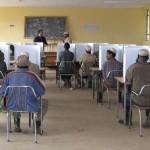The overall goal of IFPRI’s Country Strategy Support Program (CSSP) is to promote greater progress toward sustainable and pro-poor growth in developing countries by improving the design and implementation of development strategies. One of these successful efforts is the Ethiopia Strategy Support Program (ESSP), launched in 2004 with support from DFID and other donors. ESSP >> Read more
Increasing Strategic Agricultural Public Spending in Nigeria: Transforming the sector
With the support of DFID, IFPRI has for many years been at the forefront of measuring how public expenditures affect agricultural productivity and rural poverty. The strategic allocation of public expenditures in agriculture is crucial to ensuring food and nutrition security, and poverty reduction. In Nigeria, increasing agricultural productivity promises positive impacts on the poor, >> Read more
Preschool Nutrition in Guatemala and Zimbabwe: Lifelong benefits
DFID’s support of IFPRI has enabled researchers to produce landmark work confirming that early nutrition matters for development later in life. Specifically, IFPRI’s research has shown that investing in preschool nutrition has long-term positive health and economic impacts—and that failing to invest can wreak long-term damage. In 2006, IFPRI determined that undernourished preschoolers in Zimbabwe >> Read more
Ethiopia’s Productive Safety Net Programme: Enhancing people’s resilience
Ethiopia is one of the poorest, most populous, and largest countries in Africa. It has suffered challenging conditions over the past several decades—such as the 1984 drought combined with civil war that resulted in a catastrophic famine. Over the years, Ethiopia has received a large share of Africa’s emergency food aid. In 2005, the Government >> Read more
HarvestPlus: Reducing micronutrient malnutrition
Since 2004, alongside 70 partner organizations in more than 40 countries, HarvestPlus, which is supported by several transformational donors including the United Kingdom’s Department for International Development (DFID), has sought to reduce micronutrient malnutrition through biofortification. This means conventionally breeding staple food crops with higher levels of key micronutrients—namely, iron, vitamin A, and zinc—identified by >> Read more
IFPRI & DFID: 30 years of Making a Difference
IFPRI’s work in providing cutting-edge research on food and nutrition security has long depended on strategic partnerships with donors, universities, research organizations, and others around the world. One of the Institute’s key collaborators is the United Kingdom’s Department for International Development (DFID), which has served as a strategic and collaborative donor and partner to IFPRI for more than 30 years.
Highlights of IFPRI and DFID Partnership
For more than 40 years, the International Food Policy Research Institute (IFPRI) has been providing cutting-edge research and policy options on food and nutrition security to partners in donor and recipient countries around the world.
Contracting Out of Poverty
Access to markets is challenging for smallholders who may not be able to compete with larger operations that can provide firms with consistent quantities of high-quality products. This barrier to entry may be due to the smallholders’ limitations to exploit economies of scale, but it can also be due to their apprehension to sign contracts. IFPRI’s research project, Contracting Out Poverty: Experimental Approaches to Innovation in Agricultural Markets with Small Farmers, explored three innovative contract structures to solve this problem, focusing on markets for high-value crops in three diverse locations: Peru, Tanzania, and Viet Nam. Using randomized trials, innovative contract designs were developed with private companies in each country (a mango producer in Peru and milk processors in Viet Nam and Tanzania).
A Tailored Approach to Address Climate Change Impacts in Ethiopia and South Africa
MOTIVATION Global climate change impacts food and water security in significant ways, and developing countries will most likely bear the brunt of the adverse consequences. The lack of adaptive capacity and already high levels of poverty make these countries’ rural population and agriculture sector vulnerable. With support from the Federal Ministry for Economic Cooperation and >> Read more
Strategies for Adapting to Climate Change in Rural Africa
The impact of climate change will be most severe in tropical countries, like many countries in Africa south of the Sahara—particularly in those that have scarce resources to channel into adaptation strategies, whose policy makers lack information, and where there is significant poverty. Even small climate changes can have a significant impact on farmers’ livelihoods and overall wellbeing. With support from the Federal Ministry for Economic Cooperation and Development (BMZ) and the CGIAR Research Program on Climate Change, Agriculture, and Food Security (CCAFS), IFPRI worked with the Association for Strengthening Agricultural Research in Eastern and Central Africa (ASARECA), the Food, Agriculture and Natural Resources Policy Analysis Network (FANRPAN), and other national partners to generate country-level analyses on climate change impacts and adaptation strategies for 10 countries in East Africa and 8 countries in southern Africa. IFPRI published the results in three books released in 2013: East African Agriculture and Climate Change: A Comprehensive Analysis, Southern African Agriculture and Climate Change: A Comprehensive Analysis, and West African Agriculture and Climate Change: A Comprehensive Analysis.
- « Previous Page
- 1
- 2
- 3
- 4
- 5
- 6
- …
- 22
- Next Page »









